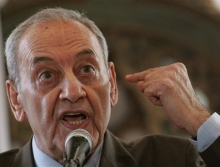Israeli Defense Minister Amir Peretz ordered the army late today to advance into southern Lebanon up to the Litani River after almost 500 rockets fell on Israel in the past two days, killing nine civilians. | The Defense Minster instructed the Israel Defense Forces this evening to prepare for the next stage of the operation... |
``The Defense Minster instructed the Israel Defense Forces this evening to prepare for the next stage of the operation,'' a ministry spokeswoman said, speaking anonymously by regulation. ``The objective is to paralyze rocket launching areas of the short range rockets from the international border and up to the Litani.''
A push to the river, which runs across southern Lebanon and in some places is as many as 30 kilometers (19 miles) from Israel's northern border, would give Israel control of a stretch of land about 30 kilometers wide and 30 kilometers deep, and would mark an escalation in the conflict, now in its fourth week, with the militant Islamic group Hezbollah. Israel previously focused on air attacks on Beirut and other places, as well as limited incursions across the border.
Prime Minister Ehud Olmert said Aug. 1 Israel won't stop fighting until a United Nations peacekeeping force great enough to contain Hezbollah is deployed in southern Lebanon. He said in an interview with The Times, London, published today that it would have to be about 15,000-strong. A UN meeting planned for today to discuss the force was canceled.
Cease-Fire Offer
 Hezbollah Secretary General Hassan Nasrallah said Hezbollah Secretary General Hassan Nasrallah said from his hidey hole his fighters won't stop attacks until all Israeli soldiers leave Lebanon, while offering a cease-fire if Israeli halts assaults. | When you decide to halt your aggression on our cities, towns, civilians and infrastructure, we will not hit any settlement or town with rockets... |
``When you decide to halt your aggression on our cities, towns, civilians and infrastructure, we will not hit any settlement or town with rockets,'' Nasrallah said from a deep, deep, deep bunker and plenty of burly hard boyz guarding the door in a speech broadcast on the group's al-Manar television station late today. Hezbollah seeks to inflict maximum casualties on Israel and is able to launch attacks on any town it chooses, he said, "and as soon as I get out of the swimming pool behind Assad's guesthouse youse are gonna get it!".
The UN has made little progress toward a cease-fire since U.S. Secretary of State Condoleezza Rice left Israel July 31 after failing to broker an agreement. A French resolution calls for an immediate cease-fire. The U.S. has resisted such a halt until a political framework is in place to disarm Hezbollah and bar the group from control of southern Lebanon.
Israeli Air Strikes
Israeli air strikes today targeted missile launchers, Hezbollah offices and a vehicle carrying weapons, the army said. Hezbollah fired 150 rockets into Israel, killing four civilians in Acre and three in Maalot, police spokesman Micky Rosenfeld said. An eighth died in Acre, Israeli medics said, making today the single deadliest day since July 16, when eight people also died.
In Lebanon, two soldiers were killed and two wounded north of Marwaheen, an Israeli Defense Forces spokesman said, speaking anonymously by regulation. That town is one of several new locations where Israeli forces are operating, said Milos Strugar, a spokesman for the UN Interim Force. Exchanges of fire in the area are ``heavy,'' Strugar said, and soldiers maintained a presence in the villages of Ayta al- Shaab, Maroun al-Ras, Mais al-Jabal and Kfarkila.
In a separate operation, aircraft fired missiles early today near Rafah in the southern Gaza Strip, killing eight Palestinians, unidentified Palestinian medical officials and witnesses said.
| ... Israeli forces had created a security zone encompassing 20 villages in Lebanon... |
The army declined to comment on reports that Israeli forces had created a security zone encompassing 20 villages in Lebanon. Israel hasn't launched a full-scale military attack on Lebanon or Hezbollah since pulling troops out of an area of southern Lebanon held for 18 years until May 2000.
Israeli jets dropped leaflets at about 6:45 p.m. local time today on two areas in southern Beirut, urging its residents to leave, Lebanon's national news agency reported.
Lebanese Deaths
More than 900 Lebanese have been killed since the fighting began, Prime Minister Fouad Siniora said in a video statement. Sixty-five Israelis have been killed, according to the military and police in Israel. Hundreds of thousands of people have been forced from their homes by Hezbollah rocket attacks on northern Israel and Israeli air raids in Lebanon.
| Hezbollah's resisting so forcefully to Israel has raised their popularity... |
Lebanon's acting foreign minister said he doubts that his government would agree to invite a European-led peacekeeping force into southern Lebanon because of opposition from Hezbollah and its allies Syria and Iran, the Washington Post reported today, citing an interview with Tareq Mitri in New York. ``Hezbollah's resisting so forcefully to Israel has raised their popularity'' during the current conflict and the group's views on the size and mandate of an international force must be considered, Mitri told the newspaper. |
 Lebanon's Parliament Speaker Nabih Berri suggested adopting phrases from the previous cabinet's policy statement concerning the "role of the resistance" in addition to UNSCR 1701 to facilitate drafting the new government's policy statement.
Lebanon's Parliament Speaker Nabih Berri suggested adopting phrases from the previous cabinet's policy statement concerning the "role of the resistance" in addition to UNSCR 1701 to facilitate drafting the new government's policy statement.
 Hezbollah Secretary General
Hezbollah Secretary General